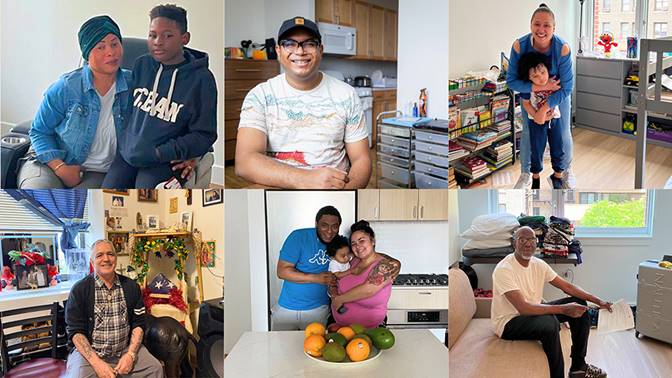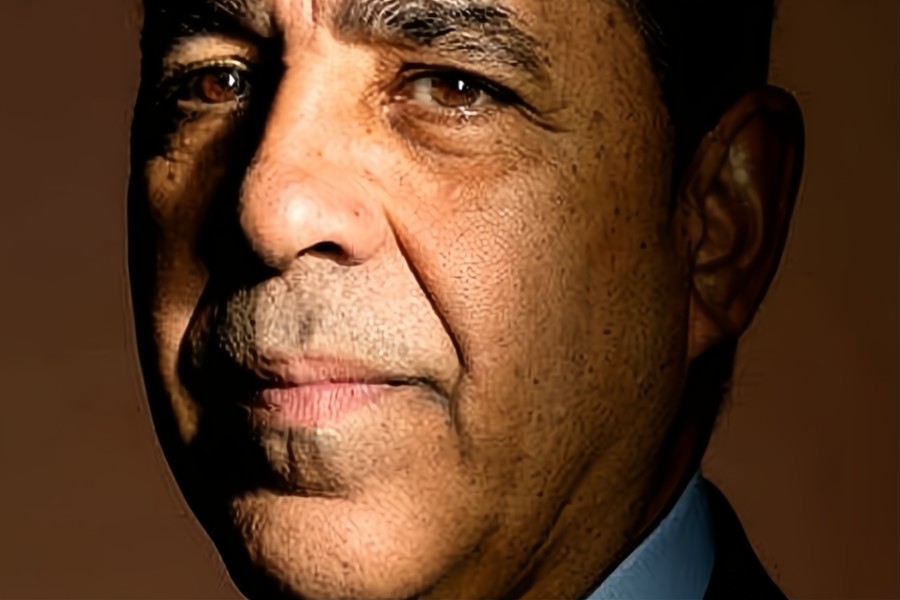
NYC Health + Hospitals today announced that over 1,200 patients and their families found housing through its Housing for Health initiative.
Patients experiencing homelessness were referred to the program as part of their healthcare at NYC Health + Hospitals. Patients are supported in gathering key documents, filling out paperwork to apply for housing, identifying housing opportunities that they qualify for, visiting the apartment, and transitioning into permanent housing. Patients who are housed through Housing for Health are placed in affordable or supportive housing and pay no more than 30% of their income towards rent. They live in all five boroughs and are connected to the health system for their healthcare. Housing for Health identifies patients through referrals from their NYC Health + Hospitals care providers, including MetroPlusHealth, the health system’s managed care organization, and the initiative’s medical respite program.
Housing for Health is also working to develop affordable and supportive housing in New York City by identifying available land controlled by the health system and partnering with developers and City housing agencies to build residential buildings on that land. The program will create over 650 new affordable homes on hospital land, supporting connections to healthcare services through proximity to care sites. In the coming year, the Comunilife Throop Residence in Brooklyn on the campus of NYC Health + Hospitals/Woodhull will be complete and ready for occupancy. Within the next year, Just Home in the Bronx on the campus of NYC Health + Hospitals/Jacobi, 1727 Amsterdam Avenue in Manhattan, and River Commons at NYC Health + Hospitals/Gotham Health, Morrisania in the Bronx will commence construction. The NYC Health + Hospitals Housing for Health initiative is supported by strategic partnerships with community-based organizations, affordable and supportive housing developers, and City agencies including Department of Social Services, NYC Department of Housing Preservation and Development, and NYC Housing Development Corporation.
“Having a home is crucial to the good health of our patients,” says NYC Health + Hospitals President and CEO Mitchell Katz, MD. “We treat the whole person, and housing is a great prescription for myriad health conditions. We are grateful to all of our partners, public and private, who support our patients on their journey home.”
“Affordable housing has become increasingly hard to find in New York City, and the global pandemic exposed the extent of the housing crisis hurting our most vulnerable communities,” said U.S. Senator Kirsten Gillibrand.“This Housing for Health initiative is providing a much-needed service for NYC Health + Hospitals’ patient population experiencing homelessness. I want to thank Mayor Adams and NYC Health + Hospitals for recognizing that stable housing plays a crucial role in the ability to treat chronic health conditions and working towards finding solutions that help improve health outcomes through social support services and permanent housing.”
“Every New Yorker deserves safe, quality affordable housing, and we see time and again that once our patients are housed, their health improves,” said NYC Health + Hospitals Assistant Vice President of Housing and Real Estate Leora Jontef. “We are so proud to have housed over 1,000 patients and their families, and we are eager to support the next 1,000 find their new home.”
“Having stable housing is a crucial factor in maintaining good health. With proper, affordable housing that offers comfort and safety, individuals can truly thrive. Our Housing Taskforce has seen the positive impact of a strong support system throughout the housing process, making it easier for patients to find and settle into new homes,” said Dr. Talya Schwartz, President and Chief Executive Officer, MetroPlusHealth. “We are excited for our members to continue benefiting from NYC Health + Hospitals’ commitment to Housing for Health.”
“Effectively treating New Yorkers experiencing homelessness requires a holistic approach which extends beyond hospitals and emergency rooms,” said DSS Commissioner Molly Wasow Park. “Stable, affordable housing is prerequisite for good health and a proven way to minimize extended and repeated hospital stays for New Yorkers experiencing homelessness. By helping connect over 1,200 patients and their families to homes and leveraging their resources to create much-needed affordable and supportive housing, NYC Health + Hospitals is proactively addressing the root causes of both poor health outcomes and homelessness. We are proud to partner with NYC Health + Hospitals on this initiative.”
“The Housing for Health initiative has proven to be a vital resource in addressing the housing needs of vulnerable New Yorkers throughout the City’s healthcare system,” said HDC President Eric Enderlin. “We applaud what NYC Health + Hospitals has been able to achieve, and look forward to furthering our partnership to deliver more affordable and supportive homes through this critical initiative.”
“Everyone at the Woodhull Safety Net Clinic was very supportive and understanding,” said Stephanie Marrone, a patient of NYC Health + Hospitals/Woodhull who found housing through the health system’s Housing for Health program. “Having my own apartment again is remarkable. My blood pressure hasn’t been this good in 30 years! It’s a beautiful apartment, and I love my new neighborhood. This is the perfect place for me to restart my life.”
- Unlocking Business Growth With Strategic SEO Practices
- How To Boost Instagram Story Views Effectively
- The Pros And Cons Of Major Types Of Grills
- Los Angeles: Yuletide Cinemaland, A Festive Celebration Of Holiday Spirit
- French Heritage Society Fêtes Reopening Of Notre-Dame Cathedral At “Celestial Ball” In New York
In 2023, NYC Health + Hospitals provided care for over 72,000 patients experiencing homelessness or housing insecurity, including over 15,000 children. Adults experiencing homelessness have three times more hospital and emergency department visits than the general population. In addition to improving participants’ lives by finding them housing, the program is expected to reduce hospitalizations and emergency room visits and improve healthcare outcomes. Housing for Health is an initiative to connect patients experiencing homelessness to stable, affordable housing and a strategy outlined in Mayor Eric Adams’ housing plan, “Housing Our Neighbors: A Blueprint for Housing and Homelessness.”
“City of Yes for Housing Opportunity,” the most pro-housing zoning proposal in New York City’s history, would enable the creation of “a little more housing in every neighborhood” through a set of carefully crafted zoning changes to boost housing supply and affordability across the five boroughs. The New York City Department of City Planning (DCP) estimates that the proposal, which is currently in public review and is anticipated to be voted on by the New York City Council before the end of the year, could produce as many as 108,850 new homes over the next 15 years.
Housing for Health recognizes that the chronic health issues of unhoused individuals cannot be treated without stable housing. This initiative seeks to improve their health and wellbeing of New Yorkers by focusing on four strategic areas: navigation services, medical respite beds, affordable housing on hospital property, and social service support for patients in permanent housing.

Housing for Health Strategies
Housing Navigation Services: NYC Health + Hospitals counsels and helps eligible patients to access and apply for supportive, affordable, and market-rate housing, as well as rental subsidies. This resource is vital to navigating the New York City complex housing landscape.
Medical Respite Beds for Frail Patients: NYC Health + Hospitals funds the largest medical respite bed program in New York City. Its medical respite beds in Manhattan offer social service support for medically frail patients who no longer need hospitalization but still require access to medical care. Medical respite services allow patients to rest, recover, and heal in a safe environment after a major health episode. Respite provides holistic care coordination, medically-tailored meals, and access to wound care and physical therapy. Patients also receive case management support to help identify future housing options.
Dedicate NYC Health + Hospitals Land for Affordable and Supportive Housing: NYC Health + Hospitals leases land for supportive and affordable housing developments for low- and moderate-income New Yorkers, including seniors and those formerly experiencing homelessness. To date, there are 1,600 apartment units on NYC Health + Hospitals land. Housing for Health plans to leverage additional land to create over 650 new affordable homes near NYC Health + Hospitals resources to deliver continuity of care for vulnerable New Yorkers.
Fund Social Support Services in Permanent Housing: NYC Health + Hospitals funds on-site social services to help patients stabilize and thrive in their new housing environment. Support services individualize support to ease the transition from homelessness to permanent housing, assistance with accessing benefits, connecting to local food pantries and employment services, and continued care coordination.
NYC Health + Hospitals
NYC Health + Hospitals is the largest municipal health care system in the nation serving more than a million New Yorkers annually in more than 70 patient care locations across the city’s five boroughs. A robust network of outpatient, neighborhood-based primary and specialty care centers anchors care coordination with the system’s trauma centers, nursing homes, post-acute care centers, home care agency, and MetroPlus health plan—all supported by 11 essential hospitals. Its diverse workforce of more than 43,000 employees is uniquely focused on empowering New Yorkers, without exception, to live the healthiest life possible. For more information, visit www.nychealthandhospitals.org
Photo credit: 1) Source. 2) Patients who found their new home through NYC Health + Hospitals’ Housing for Health initiative
Become a Harlem Insider!
By submitting this form, you are consenting to receive marketing emails from: . You can revoke your consent to receive emails at any time by using the SafeUnsubscribe® link, found at the bottom of every email. Emails are serviced by Constant Contact








